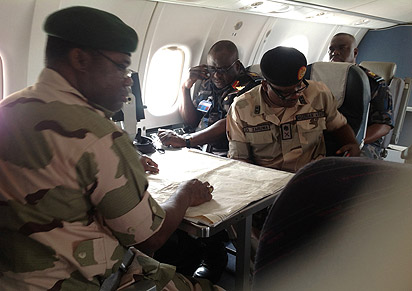Featured
Investigation: How Military’s Spending Undermines Insurgency ‘89% Budget Spent On salaries, 11% On Weapons’

The state of insecurity in the North- East, occasioned by the activities of Boko Haram, has exposed the apparent misapplication of funds by the Ministry of Defence and the various security forces in the country.
Investigation by New Telegraph showed that over the years, there has been a lopsided allocation of resources in favour of recurrent expenditure, salaries and administrative costs, leaving little for capital expenditure in the defence sector.
An audit of the 2014 national budget showed that out of a total of N966 billion allocated to defence and security, N843.5 billion, representing 89 per cent of the budget went to recurrent expenditure while a paltry N94.27 billion, representing 11 per cent, was for capital expenditure items such as the purchase of weapons and other military hardware meant to equip the troops and keep them battle ready at all times.
This trend was also reflected in the allocation of funds at the various arms and departments in the sector. According to documents sourced from the Budget Office of the Federation, the Nigeria Army allocated 96 per cent of its resources to recurrent expenditure while leaving only four per cent to capital expenditure.
Also, the Nigeria Navy allocated 89 per cent of its own share of the budget to recurrent expenditure and 11 per cent to capital expenditure while the Nigeria Air Force gave 90 per cent to recurrent and 10 per cent to capital expenditures.
The story is not different at the Department of State Security (DSS) and Office of the National Security Adviser(NSA) which allotted 75 per cent and 88 per cent of their budgets respectively to recurrent expenditure with capital expenditure getting little attention.
Although there has been a steady rise in the budgetary allocations to security sector in the last four years, there appears to have been no deliberate policy to deploy the resources to the critical areas that would put the various security services in a good stead to respond to the growing challenges of terrorism in the country.
In addition to the poor attention given to capital expenditure in the sector, New Telegraph also learnt that much of the weapons in the arsenal of the security forces were outdated and long overdue for change. Besides, majority of the personnel in the various arms of the Armed Forces needed to be retrained in the use of sophisticated weaponry and in modern warfare.
In the current year’s budget, the Nigeria Army budgeted N697.7 million for the procurement of ammunition; the Office of the National Security Adviser budgeted N837.3million for the procurement of security equipment; the Department of State Security earmarked N350 million for the procurement of firearms and ammunition while the Nigeria Air Force has allotted N286.46 million for the purchase of an MI-34/35 helicopter.
A security professional who spoke with New Telegraph in confidence said the piecemeal approach to the acquisition of basic security equipment and hardware had been the bane of the security and defence sector.
The source justified the recent request to the National Assembly by President Goodluck Jonathan for a $1billion loan to procure military hardware and equip the military to combat the insurgency in the North-East, saying it is necessary to bridge the gap in the yearly budgetary allocation to the defence sector. “It is the right and reasonable thing to do in the present circumstances.
Everybody seems to acknowledge that our troops are not adequately kitted to fight the raging insurgency and you know that a desperate problem requires a desperate solution. This is why I do not know the rationale behind some legislators in the National Assembly who have been kicking against this loan.
Do they want the insurgents to continue to torment the North-East? Unless they have links with the insurgents, I do not see the sense in any lawmaker from whatever party kicking against the loan to fight insurgency,” the source said.
Another security professional said even the Nigeria Police Force required urgent attention because the spate of insecurity would not have escalated to its present level if the police was well equipped to carry out their statutory responsibilities.
According to the security official, the controversial $9.3 million arms deal in South Africa was only a demonstration of the desperation of the security force to acquire arms to combat the insecurity in the country. He dismissed the critics who have termed the botched arms deal as a failed attempt by some persons in government to launder the funds in South Africa.
“I am a security personnel and I know that what happened in South Africa was not money laundering. It was a case of a country at war and in dire need of arms and ammunition to checkmate the situation at home.”
In his letter of request to the National Assembly, Jonathan had explained that the $1 billion will also be used to procure weapons as well as train the military and other security officers. He said that given the ongoing and serious security threats posed by the Boko Haram terrorist group, the country needed to act fast to decisively crush the insurgency.
The Senate had on Thursday approved the request amidst protests from some opposition lawmakers who said the loan might not be directed to equipping the troops but might end up as slush funds for PDP to prosecute the 2015 polls.
Chairman of the Senate Joint Committees on Finance, and Local and Foreign Debts and Chairman of the Committee on Finance, Senator Ahmad Makarfi (PDP-Kaduna), has however explained that the loan facility was not going to be in cash but would entail the supply of military hardware to be paid for over seven years.
According to him, the loan would enable Nigeria to acquire helicopters, ships and other military hardware to boost the fight against insurgency.






